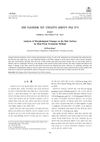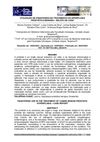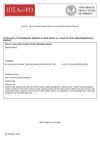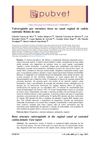 March 2024 in “Journal of drugs in dermatology”
March 2024 in “Journal of drugs in dermatology” HASHA is a safe and effective option for chin augmentation.
 January 2024 in “Polski Merkuriusz Lekarski”
January 2024 in “Polski Merkuriusz Lekarski” Pica disorder in central Iraq is mainly found in females and is linked to low iron levels; treatment with iron improves most patients.
 December 2023 in “Frontiers in endocrinology”
December 2023 in “Frontiers in endocrinology” Excess androgens may cause PCOS, not just be a symptom.
 October 2023 in “Frontiers in endocrinology”
October 2023 in “Frontiers in endocrinology” Effective PCOS treatments require targeting specific signaling pathways.
 June 2023 in “International journal of biology, pharmacy and allied sciences”
June 2023 in “International journal of biology, pharmacy and allied sciences” New medications are improving depression treatment, emphasizing accurate diagnosis and chronic care.
 April 2023 in “Han'gug miyong haghoeji/Journal of the Korean society of cosmetology”
April 2023 in “Han'gug miyong haghoeji/Journal of the Korean society of cosmetology” Direct heat perms cause more damage to hair than softening heat perms.
 March 2023 in “Enciclopédia Biosfera”
March 2023 in “Enciclopédia Biosfera” Finasteride effectively treats BPH but requires continuous use to maintain benefits.

Lower LDL-c levels predict higher COVID-19 mortality.
 August 2022 in “Frontiers in genetics”
August 2022 in “Frontiers in genetics” A new genetic change in the DSC3 gene is linked to a rare condition causing hair loss and skin blisters in a child.
 July 2022 in “L Endocrinologo”
July 2022 in “L Endocrinologo” A 77-year-old woman with hair loss had high testosterone and 17OH-progesterone levels, but no significant findings on imaging.
 March 2022 in “Brazilian Journal of Health Review”
March 2022 in “Brazilian Journal of Health Review” COVID-19 can cause a type of hair loss that usually starts 3-6 months after the illness, and treatment includes stress reduction and hair care products like Minoxidil.

The document concludes that the development of certain tumors is influenced by genetic background and that a specific gene modification can lead to tumor regression and reduced growth.

Oral minoxidil is as effective and safe as topical minoxidil for treating female pattern hair loss.
 November 2021 in “Folia Microbiologica”
November 2021 in “Folia Microbiologica” Trichophyton bullosum has been found causing severe skin infections in donkeys in North Africa for the first time since 1933.

A spayed dog with vaginal bone structures causing infection was successfully treated by removing the bones and administering medication.
 March 2021 in “Actas Dermo-Sifiliográficas”
March 2021 in “Actas Dermo-Sifiliográficas” The microbiome may be linked to hair loss and could be a target for new treatments.
 February 2020 in “International Journal of Advanced Research”
February 2020 in “International Journal of Advanced Research” The Garcinia Cambogia Nutri Bite could help manage PCOS symptoms.
 December 2019 in “Pubvet”
December 2019 in “Pubvet” The document concludes that atopic dermatitis in dogs is managed with various treatments including antipruritics, supplements, and possibly immunotherapy.
 June 2019 in “Journal of Dermatological Treatment”
June 2019 in “Journal of Dermatological Treatment” BM-PHA is as effective and safe as Restylane Perlane for improving nasolabial folds with minor side effects.
 January 2018 in “Stem cell biology and regenerative medicine”
January 2018 in “Stem cell biology and regenerative medicine” ATP-dependent chromatin remodeling is crucial for skin development and stem cell function.
 January 2018 in “Springer eBooks”
January 2018 in “Springer eBooks” Hidradenitis Suppurativa is likely an autoinflammatory disease, and better understanding its causes could improve treatments.

Early NAS level changes affect alcohol consumption vulnerability.
 December 2017 in “The journal of investigative dermatology. Symposium proceedings/The Journal of investigative dermatology symposium proceedings”
December 2017 in “The journal of investigative dermatology. Symposium proceedings/The Journal of investigative dermatology symposium proceedings” The summit aimed to speed up finding treatments for alopecia areata.
 November 2017 in “Elsevier eBooks”
November 2017 in “Elsevier eBooks” PCOS is a genetic disorder affecting women's reproductive health, with treatments focused on symptoms like insulin resistance and fertility.
 September 2017 in “Journal of Investigative Dermatology”
September 2017 in “Journal of Investigative Dermatology” Hair follicle cells change their DNA packaging during growth cycles and when grown in the lab.
 September 2017 in “Journal of Investigative Dermatology”
September 2017 in “Journal of Investigative Dermatology” Aging causes sweat glands to shrink and move upward, leading to less elastic skin and more wrinkles.
 September 2017 in “Journal of Investigative Dermatology”
September 2017 in “Journal of Investigative Dermatology” Aging causes sweat glands to shrink, leading to skin issues, and blue light can help hair grow.
 April 2017 in “The journal of investigative dermatology/Journal of investigative dermatology”
April 2017 in “The journal of investigative dermatology/Journal of investigative dermatology” Stress in hair follicle cells increases certain immune-related proteins, which might contribute to hair loss conditions.
 May 2016 in “Research opinions in animal & veterinary sciences”
May 2016 in “Research opinions in animal & veterinary sciences” Maternal aspartame consumption during pregnancy leads to skin damage and higher apoptosis in newborn rat offspring.
Avicennia Marina extract and avicequinone C can reduce hair loss hormone production and increase hair growth factors, suggesting they could be used to treat androgenic alopecia.





























